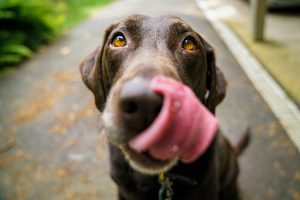Blog
Sniffing out the smell of Covid-19
Written by Gunn Benjaminsen
April 17, 2020
Photo by James Barker on Unsplash
Can sniffer dogs be used on the frontline in the fight against Covid-19? Professor James Logan at the London School of Hygiene & Tropical Medicine (LSHTM) is hopeful that it is possible to train dogs to detect the disease, even in people who are infected but show no symptoms. Most diseases have an odour associated with them, and Professor Logan has initiated a study on the smell of Covid-19.
On 15 May, The Guardian reported that the UK Government is providing £500,000 for the sniffer dog trials. The dogs will be trained to sniff out symptoms of Covid-19 in humans before they have symptoms.
“One of the first things we need to do is to demonstrate that Covid has a distinctive smell. If it does, I am really confident that the dogs would be able to detect it and would be able to learn that smell.”
Professor Logan, who is Head of the Department of Disease Control at LSHTM and Director of ARCTEC, is leading a long-term malaria project that has trained dogs to detect malaria, even in people who are asymptomatic. The malaria project demonstrated that people’s odour changes when they are infected and that mosquitos are attracted to this smell.
The hope is now that dogs can do the same with Covid-19.
Four to six weeks of training
The first step of the study is to determine whether or not Covid-19 has a distinct smell. The next step would be to transfer the smell and start training the dogs in the same way they can be trained to sniff out other diseases.
LSHTM is working with Medical Detection Dogs in Milton Keynes. This NGO has extensive experience in training dogs to detect diseases such as Parkinson’s, cancer and low blood pressure. In the case of Covid-19, Professor Logan estimates that it would take between four and six weeks of training before a dog can graduate as a qualified Covid-19 sniffer.
“They are remarkably quick at learning”, Professor Logan says.
Dogs’ superior sense of smell makes it possible for them to separate between samples with and without odours from diseases. By giving dogs a reward each time they mark a sample with odours from a disease, a method also known as conditional learning response, dogs learn which samples to mark. The researchers believe that dogs could supplement ongoing testing by screening for the virus accurately and rapidly, potentially triaging up to 250 people per hour.
Could help diagnostics in low-income countries
Using dogs to detect Covid-19 creates new possibilities to help combat the pandemic. Professor Logan points to airports and other points of entry as places where sniffer dogs could have a big impact. In the same way that airports use dogs to sniff out explosives, drugs or food, trained dogs could work in airports to identify asymptomatic travellers with Covid-19.
In the longer term, Professor Logan sees the potential for sniffer dogs to help developing countries effectively diagnose Covid-19.
“For our malaria work, we are quite far down the line in terms of planning how we’re going to scale this up within low-income countries, so we already have a good model for how we might be able to do this. We would be looking at using some of this learning to be able to scale up dogs for use in developing countries as well, where access to diagnostics may be even more scarce than they are here.”
LSHTM and Medical Detection Dogs collaborate with Durham University on this project. You can read more about this project on LSHTM’s website.

